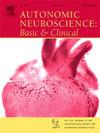跨性别、性别多样化和非二元成人的心血管疾病风险与自主神经失衡有关吗?
IF 3.3
4区 医学
Q2 NEUROSCIENCES
引用次数: 0
摘要
血压是心血管健康的一个关键指标,长期处于高水平会增加心脏病和中风等心血管疾病的风险。新出现的证据表明,跨性别、性别多样化和非二元(TGD)成年人的血压往往高于年龄匹配的顺性别成年人,这对应于该人群中心血管疾病风险的增加。然而,TGD成人血压升高的机制尚不清楚,这给TGD确认医疗保健带来了挑战。考虑到自主神经系统在心血管疾病中的作用,其中副交感神经活动减少和交感神经活动增加是心血管疾病的关键危险因素,本综述探讨了这样一个问题:“TGD成人心血管疾病风险是否与自主神经失衡有关?”目前对TGD种群的自主平衡研究有限。因此,本综述考虑了tgd特异性因素,如少数民族压力、生活方式行为、性别和性别以及激素(即睾酮、雌激素、孕酮)如何影响自主神经平衡。最后,本综述旨在强调跨学科研究的迫切需要,以阐明这些机制,并在血压自主控制和整体心血管健康领域推进tgd包容性医疗。本文章由计算机程序翻译,如有差异,请以英文原文为准。
Is cardiovascular disease risk in transgender, gender-diverse, and non-binary adults associated with autonomic imbalance?
Blood pressure is a key indicator of cardiovascular health with chronically high levels increasing the risk of cardiovascular diseases (CVD) such as heart attack and stroke. Emerging evidence shows that transgender, gender-diverse, and non-binary (TGD) adults tend to have higher blood pressure than age-matched cisgender adults, corresponding to an increased CVD risk in this population. Yet, the mechanisms underlying elevated blood pressure in TGD adults remain unclear, posing challenges to TGD-affirming healthcare. Given the autonomic nervous system's role in CVD – wherein reduced parasympathetic and heightened sympathetic activity are key risk factors for CVD – this review explores the question: “Is cardiovascular disease risk in TGD adults associated with autonomic imbalance?” Limited research exists on autonomic balance within TGD populations. Accordingly, this review considers how TGD-specific factors, such as minority stress, lifestyle behaviors, sex and gender, and hormones (i.e., testosterone, estrogen, progesterone), may impact autonomic balance. Finally, this review aims to underscore the critical need for interdisciplinary research to elucidate these mechanisms and advance TGD-inclusive healthcare in the domains of autonomic control of blood pressure and overall cardiovascular health.
求助全文
通过发布文献求助,成功后即可免费获取论文全文。
去求助
来源期刊
CiteScore
5.80
自引率
7.40%
发文量
83
审稿时长
66 days
期刊介绍:
This is an international journal with broad coverage of all aspects of the autonomic nervous system in man and animals. The main areas of interest include the innervation of blood vessels and viscera, autonomic ganglia, efferent and afferent autonomic pathways, and autonomic nuclei and pathways in the central nervous system.
The Editors will consider papers that deal with any aspect of the autonomic nervous system, including structure, physiology, pharmacology, biochemistry, development, evolution, ageing, behavioural aspects, integrative role and influence on emotional and physical states of the body. Interdisciplinary studies will be encouraged. Studies dealing with human pathology will be also welcome.

 求助内容:
求助内容: 应助结果提醒方式:
应助结果提醒方式:


